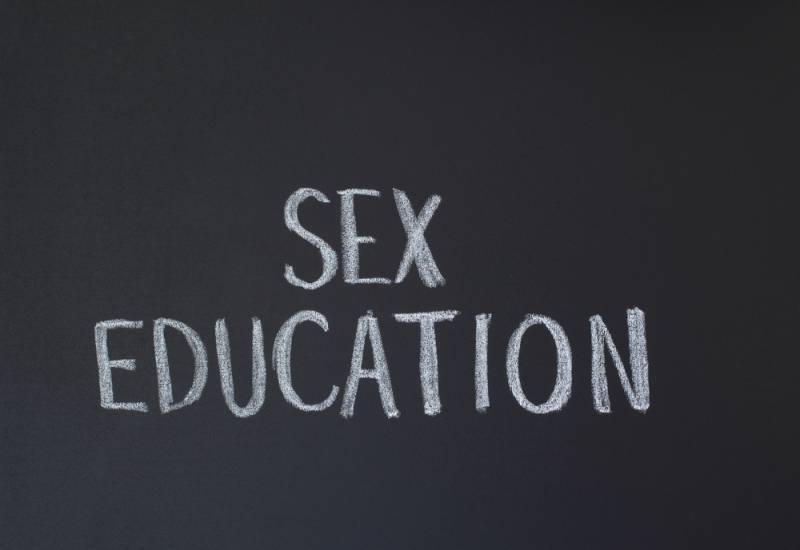Sex education in Russia was doomed from the start.
The Duma continues to look for new ways to lower the number of abortions in Russia. The number is indeed high: In 2013, more than 1 million procedures had been carried out.
Firstly, Patriarch Cyril, the head of the Russian Orthodox Church, suggested excluding abortions from the universal medical insurance scheme that covers them free of charge. Then, the Committee on Family, Women and Children, headed by Elena Mazulina, recommended special licensing for doctors who perform abortions, limit the sale of certain medicines and introduce mandatory screening for a heartbeat prior to abortion. At the end of March, it was proposed to take on young people and prohibit abortions for girls from 15 to 18 years of age without parental consent.
It is obvious from this list of measures suggested by lawmakers that these are not aimed at lowering the number of unwanted pregnancies, but to make sure that as many pregnancies as possible result in childbirth.
The children’s rights Ombudsman, Pavel Astakhov, is not trying to conceal this: “We have up to 2 million abortions a year – it’s a catastrophe that should not be taking place, since we already have a small population.” At the same time, Astakhov has been actively combating the very idea of introducing sex education in Russian schools, which goes against “the moral norms, ethics and traditions of our country.” “I am a convinced opponent of the so-called sexual enlightenment among children, regardless of age,” he says. “People ask me, When will sex education be introduced? And I answer, Never.”
Worldwide, there are two main approaches to sex education: advocating abstinence, and a complex program that includes information on both contraception and interpersonal relationships, helping young people make educated choices.
According to Astakhov, the American program of education and abstinence serves as a good approach to sex education among children. But it should be noted that the United States is hardly the best example to imitate in this case, as it is currently the leader in teenage pregnancies among developed countries — according to the Guttmacher Institute, 57 per 1,000 girls aged 15-19. For comparison, this number is 26 in Spain, 14 in Singapore and 46 in Russia which, despite a recent drop, is above average for Europe. As the authors of the United Nations State of World Population report point out, two major studies have found that “abstinence-only programmes are not effective at stopping or delaying sex.”
The highest indicators of teenage pregnancies in the US, according to the report, occur in the states where abstinence is encouraged, and the states where information on contraception is disseminated without prejudice see the lowest rates in the country.
On Genocide of the Russian People
Sex education in Russia was doomed from the start. In 1996, the UN-funded course on sex education was piloted in several schools. The project was swiftly condemned by the media: The UN was accused of encouraging abortions and of attempting to curb the country’s population, as well as a silent genocide of the Russian people. The church and the Communist Party, which then held a majority in the State Duma, turned against the project, and it was eventually closed down in 1997.
Opponents of sex education in Russia argue that information about sex corrupts young adults; encourages early sexual relations; increases the number of sexually transmitted diseases (STD), including HIV; and, consequently, exacerbates the demographic crisis in the country.
Currently, the lowest rate of teenage pregnancies in Europe is in Switzerland (8 per 1,000 girls aged 15-19) and the Netherlands (14 per 1,000). Research studies correlate these statistics with long-established sex education programs, freely-available family planning services and low cost contraceptives.
Gas Masks and Condoms
It cannot be said that Russian school children know next to nothing about safe sex. In 2012, reproductive health, treatment of STDs and AIDS, gender relations and family law were introduced to the curriculum. Now, the public safety course (PSC, mandatory in Russian schools – Fair Observer) teaches not only about battle flags and armed forces camaraderie, but also how “intensive sexual activity at a young age results in untimely termination of sexual relations,” and that the “Russian Orthodox Church considers sexual relationships possible only in marriage.”
As a rule, sex education under PSC is limited to a warning that HIV and other sexually transmitted diseases can be prevented by the use of condoms and having fewer partners.
As a Moscow PSC teacher told The Village, he has been providing sex education for four years:
“The lessons on the subject are taught to seniors in May; as you know, class attendance falls at the end of the school year, but it is easier to hold these lessons when there are fewer students present – they are less shy. I have consulted the Institute of Hygiene on the best ways to approach the course. The intimate question of unwanted pregnancy is discussed with girls separately – boys don’t really need it yet. There are all sorts of questions being asked in class, from ‘What is love?’ and ‘How do you court a lady?’ to direct questions on contraception.”
There are a number of problems associated with this approach. First, the amount and accuracy of information depends primarily on the teacher. Second, if only girls are aware of measures to prevent unwanted pregnancies, they will find it difficult to convince their partners to use a condom. But, most importantly, by the time they reach their final year at school, teenagers, as a rule, have already become sexually active.
Specialists approached by The Village give different estimates on the age of sexual initiation in Russia. “Sexual debut occurs at around 15-17 [among Russian teenagers], and this is a very optimistic number: In the countryside, sexual relations begin much earlier,” says the former director of the Dance4Life project in Russia Tatiana Evlampieva.
“The age of sexual initiation is very protracted: There are kids who desperately begin at 11,” adds Tatiana Dymova, a psychologist at the psychological center Perekryostok. “These are often very unpleasant stories, such as sexual abuse by parents or family friends. There are kids who are very responsible, and for them it matters who their first partners are. They can start their sexual lives as late as 20. In vocational schools, the age drops significantly – to 13-14 — and many girls attend classes already pregnant.
The “House Position”
The Village decided to conduct its own survey and find out from 18 students (aged 16-17, attending different Moscow high schools) at what age they and their friends became sexually active, what contraception they used, and whether they had been told about contraception in class.
Of the 18 surveyed (eight boys and ten girls), only seven have not yet had sexual relations. Five students were informed on sex education in biology class, and three in the public safety course. The other ten have not heard about contraception at school.
Of the 11 who are sexually active, only seven have been using condoms. One girl practiced the early withdrawal method: “I have a regular partner,” she says. (She is one of the few who have had sex education classes.)
The majority of those surveyed began sexual activity at 14-16, and some of their answers shocked The Village editors: “Many friends start at around 16, don’t use any contraception as it’s too embarrassing to ask for at the pharmacy,” one young man told us. “No one told us about it at school. The biology teacher said that we should wear two condoms at once to prevent them from breaking.” (Using two condoms at once actually increases friction and the chances of condoms breaking during sex – The Village.) One of the young fellows answered the question, “What types of sex do you practice?” with “The house position.” The Village team does not feel competent enough to elaborate on this term.
Only four of the 18 teenagers have been told about contraception by their parents. “I found out about the need to be careful from the Internet,” one student told us. “My parents did not talk about these things with me. I once found a pack of condoms in their drawer and asked what it was, but they didn’t tell me. Then I found out everything online.”
“There are many parents now who are ready to do whatever it takes for their children,” says Dymova. “But there are parents who struggle communicating with their kids, and this topic is embarrassing for them. But there is a trend: Whereas before parents did not address these questions at all, they are now at least trying to find out whether they should try to bring up sex, and try to tell their kids some things about it. Many worry, but do not initiate the discussion to avoid controversy.”
The Parents
“I would like to see parents dedicate more time to their children,” says Elena Klimova, the founder and director of the Children-404 LGBT Teenagers project. “Talk to your kids, be honest with them. Answer their questions, don’t wave them off. Children will always look for answers; which ones will they find, who will they turn to? There is no embarrassment in talking about the sex aspect of life. It is important for your peace of mind and your children’s safety.”
Klimova has conducted her own survey of LGBT teenagers in Russia and CIS states. Some 33.9% found out about contraception online, 17.6% from the media and 16.8% from books. Only 13% were informed by parents, and even fewer (8%) by teachers. The author of the study concluded that friends remain the most popular information source about sex, but also the least reliable.
It would no doubt be better if teenagers found out about contraception from people close to them – someone they trust – and not from a former military commander teaching public safety at school. But sexual awareness among Russian adults does not much exceed that of teenagers. First of all, adult women do not seem to be familiar with the advances in pharmacology, as they continue to undergo an extraordinary number of abortions: Among those aged 20 to 34, 732,000 were performed in 2013, and for those over 35, the number was 232,000 in the same time period. According to the UN, 35% of Russians use outdated contraceptive methods such as working out ovulation cycles or early withdrawal. In developed countries, the number of those engaging in such sorts of extreme sex is less than 10%.
In 2013-14, the pharmaceutical company Gedeon Richter conducted a survey and found that the annual number of unprotected sexual acts per person in Russia is 43; the only European country with a higher statistic is Serbia. The most popular family planning methods are condoms and early withdrawal. Moreover, Russians struggle even with the use of condoms: 35% have experienced condom failure, which is above average on the global scale.
There is also a lack of up-to-date information on sexual awareness in Russia: The most recent report is from 2011. Then, Russia’s Health Ministry and the federal statistics service (ROSSTAT), with support from the UN Populations Fund, the US Agency for International Development (USAID) and the Center for Disease Control (CDC), conducted a wide-ranging study on reproductive health among Russian women, with over 11,000 participants. Some findings are shocking: 41% of those surveyed (aged 15-24) admitted to not using contraception the first time they had sex; 51% explaining this with the “spontaneity” of the act; while 21% simply “did not think about it.” Only 37% of those surveyed in this age group knew about emergency contraceptives.
The Experts
When The Village asked specialists working with teenagers to assess their level of sexual awareness, they came up with different answers. “Teenagers are completely clueless when it comes to sex: They don’t know how to use contraception, repeating the behavioral stereotypes of adults,” says Evlampieva. “Most young men think that early withdrawal protects against everything – HIV, STDs. When we prepared an event for the Contraception Day, we found out that teenagers considered early withdrawal to be the most effective way to prevent pregnancy.”
Other experts think that teenagers know everything about contraception, but have trouble communicating. “Very often teenagers look and behave as there is nothing to talk about. In my view, they know what contraceptives are and how to have sex. But many don’t know if it’s appropriate to have sex on the first date, if that is a good or a bad thing,” says Dymova. “For example, if the boy you like wants to have sex, should you agree just not to lose him?”
In 2011, Moscow schools were being grouped into single educational complexes, and “extra” doctors and psychologists were made redundant. Now, not every school has a psychologist whom the students could approach for advice, but schools can contact psychology centers to conduct training courses, and are encouraged to sign contracts with these. Theoretically, a school can request a program to prevent risky sexual behavior, such as the one that the Perekryostok psychological center has been running for two years. But whereas before such initiatives were state-funded, now there is a fee attached.
“The aim of our program is to give kids an idea about their own safety,” Dymova explains. “We do not accentuate the use of condoms, but talk about communication strategies and develop scenarios that teenagers often find themselves in. Often, their safety comes into question not because they don’t know that they should be using condoms, but because in some situations it is difficult to say no. For example, many teenagers were forced into sex and then the video of the act was posted online.”
According to Dymova, schools can request such seminars if they “notice something like this; if there is a couple who kiss during class breaks, and the teachers don’t know how to manage it.” But most schools “don’t request such programs while everything appears to be alright.”
Protecting Children from All Ills
According to the experts, their work is complicated by the Law on Protection of Children from Harmful Information to Their Health and Development, passed in 2012, and the 2013 ban on propaganda of non-traditional sexual relations among young adults.
“I can’t even determine the level of sexual awareness,” complains Evgeny Kashenko, head of sexology department at the Humanities, Economics and Technology Institute and author of A Frank Conversation “About It” With a Teenager. “Before 2012, I could come to a school, and since 2012 it’s impossible. None of [the] principals would invite me, because you need a written permissions of every parent. Thankfully, I finished the book before the law was passed.”
Kashenko suggested providing psychologists working with teenagers with additional courses on sexology, but this idea failed: “I reached out to the directors of Moscow psychology centers, asking them to send specialists to me, free of charge, to learn about the foundations of sexual awareness so they could consult teenagers. But nobody came. The taboo comes from high up.”
“We try not to talk about homosexuality, because it is hard to see what is meant by ‘propaganda,’” says Dymova. “But young people who understand that they are gay come to us.” “Laws against gay propaganda and harmful information place a gag order on all specialists who can talk about it with the kids,” adds Evlampieva. “I have been approached by people working in orphanages wanting to know how to deal with gay children. Even telling them that it’s normal would qualify as propaganda. But you have to at least tell these boys that they need to get tested for HIV every six months.”
In 2014, the head of Russia’s Ministry of Health Veronika Skvortsova announced that since 2011, the rate of HIV infections among teenagers increased by 4.7%. According to her, this is due to infection transmitted from mothers to children during birth, in the 1990s and early 2000s.
Members of nongovernmental organizations (NGO) working with HIV prevention consulted by The Village doubt this hypothesis. “In Moscow [in 2005 – The Village], member of parliament Stebenkova conducted the campaign ‘No Such Thing as Safe Sex,'” remembers Evlampieva. “They put forward an idea that being monogamous and faithful protects against HIV, and that condoms don’t provide 100% protection. This anti-propaganda resulted not in teenagers abstaining from sex, but mistrusting condoms. Medical gloves give 20% protection against HIV in case of a needle prick, but all nurses wear them. A condom provides 98% protection. Being faithful to one partner doesn’t always work: Your partner may have a life of his or her own. I was told about a religious girl who met her partner in church and contracted HIV from him, although he was her first and only partner.”
HIV prevention programs in Russia were previously financed by international donors such as the Department for International Development (DFID), USAID and The Global Fund to Fight AIDS, Tuberculosis and Malaria. Now, their work in Russia has been suspended.
Opponents of Sex Education
Opponents of sex education in schools insist that they are supported by parents who worry about their children being corrupted. But judging by the available studies, Russian parents in general approve of sex education. According to a survey conducted by ROSSTAT and the Ministry of Health in 2011, 87.4% of respondents support the need for information on contraceptives in schools.
The Center for Social Research and Non-Commercial Sector (Higher School of Economics) interviewed more than 500 parents of children under 18. Then, 64% of parents thought that the responsibility for sex education is divided between the family and the schools. Some 87% think that you should talk to children about contraceptives before they become sexually active, and 62% think schools should introduce courses on sex education. But parents are wary of schools: 81.5% would prefer if external specialists – such as medical professionals and psychologists – conducted these courses as opposed to teachers.
According to ROSSTAT, the most intransigent opponents of sex education number just 16% out of 10,000 surveyed. Most frequently, these are the parents with three or more children, with limited financial resources, uneducated and unemployed. It is strange that the opinions of precisely this group of adults by some random chance remains the deciding factor when it comes to the question of health and well-being of all Russian teenagers.
*[This article was originally published in Russian by The Village and was translated to English by Anna Pivovarchuk.]
The views expressed in this article are the author’s own and do not necessarily reflect Fair Observer’s editorial policy.
Photo Credit: Masson / G-Stockstudio / Wrangler / Aquarius83men / Shutterstock.com
 We bring you perspectives from around the world. Help us to inform and educate. Your donation is tax-deductible. Join over 400 people to become a donor or you could choose to be a sponsor.
We bring you perspectives from around the world. Help us to inform and educate. Your donation is tax-deductible. Join over 400 people to become a donor or you could choose to be a sponsor.
Support Fair Observer
We rely on your support for our independence, diversity and quality.
For more than 10 years, Fair Observer has been free, fair and independent. No billionaire owns us, no advertisers control us. We are a reader-supported nonprofit. Unlike many other publications, we keep our content free for readers regardless of where they live or whether they can afford to pay. We have no paywalls and no ads.
In the post-truth era of fake news, echo chambers and filter bubbles, we publish a plurality of perspectives from around the world. Anyone can publish with us, but everyone goes through a rigorous editorial process. So, you get fact-checked, well-reasoned content instead of noise.
We publish 2,500+ voices from 90+ countries. We also conduct education and training programs
on subjects ranging from digital media and journalism to writing and critical thinking. This
doesn’t come cheap. Servers, editors, trainers and web developers cost
money.
Please consider supporting us on a regular basis as a recurring donor or a
sustaining member.
Will you support FO’s journalism?
We rely on your support for our independence, diversity and quality.




















Comment